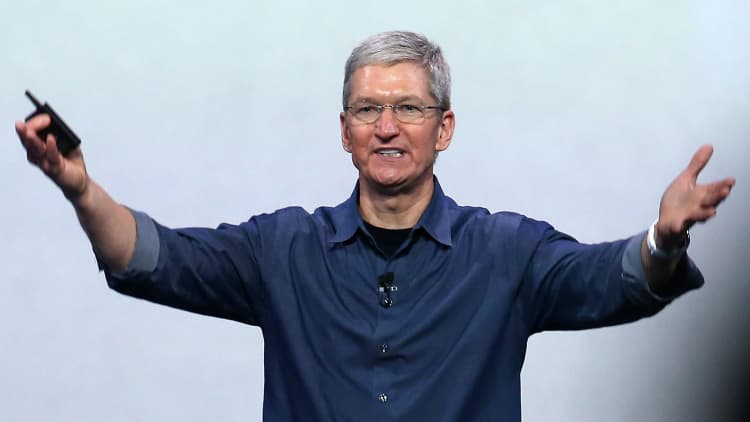Apple still makes the bulk of its money selling iPhones. But in trying to show investors that it can thrive in high-margin software, the company has built a services unit that's now approaching $40 billion in annual revenue. But it's leaving money on the table by failing to embrace the biggest trend in the software industry: subscriptions
Music, apps, cloud storage, customer support and Apple Pay are all popular services among Apple's vast population of gadget owners. They've helped the services business grow 53 percent in the past two years, while iPhone sales have only increased 16 percent over that stretch.
Apple's focus on software should entice investors, who have shown a willingness to pay higher sales multiples for fast-growing companies like Salesforce, Workday and ServiceNow in enterprise software and Netflix and Spotify in the consumer world. But unlike those companies and older software vendors such as Adobe and Microsoft, which have migrated to the cloud in recent years, Apple hasn't fully embraced subscription software.
Apple has a suite of products called Pro Apps, used primarily by audio and visual professionals, that customers buy and download onto their local hard drives — the way software worked in the pre-cloud days. Users of Mac computers go to the App Store to purchase Final Cut Pro, Logic Pro X, Motion, Compressor and MainStage 3. They each have separate prices — Final Cut Pro X costs $300 — and the whole package costs $630.
Those are all products that Apple could conceivably host in the cloud and charge monthly subscriptions to use (Apple Music, for example, costs $10 a month for unlimited streaming). The model, known in the technology world as software as a service, provides less revenue up front but potentially much more over time if customers see the value and renew annually. Last year Apple said Final Cut Pro X had 2 million users, but none are paying for the video production software on a recurring basis.
Gene Munster, who spent 12 years covering Apple as an analyst before starting investment firm Loup Ventures in 2016, estimates that only 30 percent of Apple's services revenue comes from subscriptions, suggesting that the company is potentially leaving billions of dollars of future sales on the table.
"I don't know why it hasn't happened yet," Munster told CNBC. He said that converting pro apps to subscription services would be "very logical."
An Apple representative didn't respond to requests for comment.
There's plenty of growth in the business. In the latest quarter, Apple reported a 31 percent revenue increase in services to $9.2 billion, representing 15 percent of total sales. That's up from 12 percent in the same period two years earlier.
"An acceleration in growth despite Apple's already large services revenue base is that much more impressive," wrote Neil Cybart, an analyst at Above Avalon, in a report last week.
Apple made a subscription push at its annual Worldwide Developers Conference three years ago, when it introduced Apple Music, a change from its previous strategy of charging for every song or album download on iTunes. It also sells iCloud storage on a subscription basis, with monthly prices ranging from $1 to $10.
While investors are showing a clear preference for subscription businesses, they require fundamental shifts in how companies build and support products and how they incentivize salespeople. It costs a lot of money to land a new customer but can take many months, if not years, before that user turns profitable.
Uncertainty can hurt the stock price
Also, some users will inevitably stop paying, an issue known in cloud software as churn. Cloud companies typically have automated systems and teams dedicated to getting customers to renew. Apple has become the world's most valuable company by creating consumer products that people love, not by hiring "customer success" representatives to keep teams paying for iCloud.
"The general thought was whenever you change your model, it just created a bunch of uncertainty, which negatively impacts the stock," Munster said.
Still, software is increasingly running in the cloud and legacy businesses are being forced to adapt. Adobe has pushed longtime users of apps to the Creative Cloud, and Microsoft has had success with Office 365, the cloud version of its license-based productivity suite. Some analysts view stragglers as a part of Microsoft's growth opportunity over the next few years.
Apple's services business could use a similar revenue driver, especially with the smartphone market having reached saturation. In 2016, iPhone revenue — and overall company sales — dropped for three straight quarters, on a year-over-year basis.

Munster wrote in a note last week that services will represent 20 percent of Apple's revenue by 2023. In an interview, he said that Apple could roll out new subscription services in augmented reality, artificial intelligence and video.
Byron Deeter, a partner at Bessemer Venture Partners and a big investor in cloud software start-ups, said the opportunity is clearly there for Apple.
"You could absolutely see the case for an ambitious general manager saying, 'Give me a gang of engineers, I'm going to make this a cloud business, and let's go for it and launch it,'" Deeter said. "People just aren't going to want these desktop products five years from now."
Given Apple's ubiquity with consumers and the fact that people use Apple devices for work, the company could also focus on software for businesses, like making iCloud more suitable for the workplace, according to Deeter. A report earlier this year from Barclays suggested that an enterprise-grade iCloud could help Apple decrease its dependence on hardware.
"They have such great engagement," Deeter said. "They already own the consumer at home and people are already using their products in a lot of professional settings."
More from Tech Drivers:





